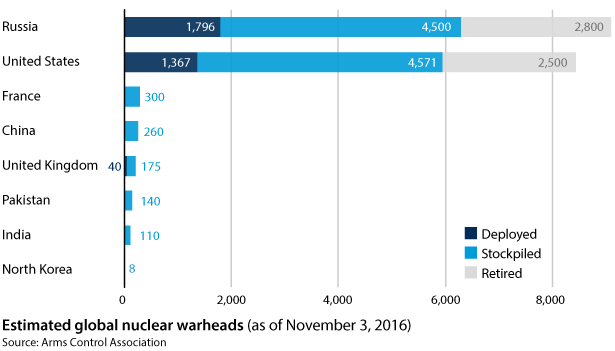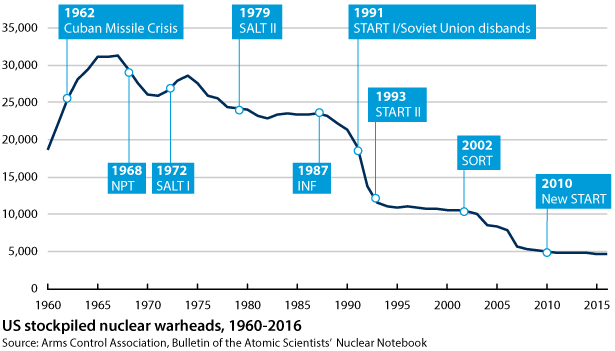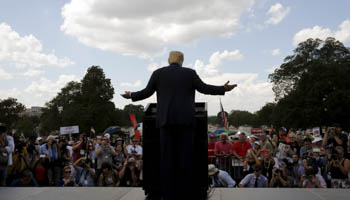Trump could shift US thinking on nuclear weapons
Citing international dangers, Trump has called for Washington to boost its nuclear arsenal and reverse past reductions
Following a North Korean claim on January 1 that it is in the "final stage" of a programme to develop an intercontinental ballistic missile, President-elect Donald Trump responded with a post on Twitter saying that Pyongyang developing a nuclear weapon capable of reaching the United States "won't happen", without elaborating why. Uncertainties surround Trump's willingness to uphold past US foreign policy commitments; nuclear weapons policy is no exception. The next administration will take power with political squabbles deadlocking arms control institutions, fraying international consensus on shared priorities for reducing nuclear dangers, and Washington standing opposite nuclear-armed states in several simmering disputes.
What next
The Trump administration is likely to recentre US nuclear weapons policy on the utility of continued possession for regional security and downplay earlier administrations' language favouring restraint. A US arsenal build-up or upgrade would set back international arms control, disarmament and non-proliferation efforts and encourage destabilising knock-on effects in key US regional relationships.
Subsidiary Impacts
- North Korean technological advances will render the US goal of Pyongyang's eventual denuclearisation untenable.
- Trump will scrutinise Iran for nuclear deal backsliding; Tehran may nevertheless see benefits in strict adherence.
- Washington questioning its post-1979 'One China' policy towards Taiwan could lead Beijing to adopt a more provocative nuclear posture.
- US allies in Asia and NATO will view nuclear policy shifts as clues to Washington's relative commitment to their security.
- Trump's overtures may lead to greater cooperation with Russia on sanctions and counterterrorism, but probably not arms reductions.
Analysis
Declaratory policy -- the clarifying or obfuscating of conditions under which a state would employ a nuclear weapon -- is a key tool for leaders seeking to bolster the credibility of their nuclear deterrent in the minds of adversaries, extend the hypothetical coverage of the nuclear umbrella or engage in trust-building measures with other nuclear-armed states (see UNITED STATES: Nuclear shift would lack credibility - August 10, 2016).
During the election campaign, Trump's freewheeling rhetorical style and comments on nuclear weapons were attacked by Democratic candidate Hillary Clinton as evidence of his untrustworthiness as commander-in-chief.
Official stances on nuclear issues can offer insight into White House national security thinking
The president possesses sole legal authority to order a nuclear strike under US command-and-control systems.
Therefore, the president-elect's public statements on nuclear weapons will be watched closely. Foreign leaders will seek to gain insight into Trump's decision-making from his advisers, issue linkage and relationship with the military and national security bureaucracy (see PROSPECTS 2017: US foreign policy - November 30, 2016).
Nuclear Posture Reviews
Given the president's near-untrammelled executive authority over the US nuclear arsenal, Congress has required the Department of Defense to conduct Nuclear Posture Reviews (NPRs).
The report, compiled with input from the military, State Department and Department of Energy, outlines official thinking on nuclear weapons and their role within US national security policy. They are intended to be published every five to ten years.
The Trump administration is due to produce a report required by Congress on US nuclear weapons policy
The third and most recent NPR report was published in April 2010 and made available to the public in full, in contrast to the classified NPRs of 1994 and 2001, where only a sanitised version was made available to the public.
The Trump administration is due to conduct a fourth NPR, though its report may be once again classified (the unabridged report on the 2001 NPR was leaked to the press).
US nuclear policy debate
The United States -- like the other nuclear-armed permanent members of the UN Security Council -- is committed under Article VI of the Nuclear Non-Proliferation Treaty to pursue negotiations "in good faith" aimed at reducing weapons stockpiles and eventually full nuclear disarmament.
Washington has often stated that it aims to diminish the role of nuclear weapons in its national defence, albeit while maintaining a credible extension for its European and Asian allies. Policymakers often cite current international instabilities as reason for not pursuing disarmament.
There are two broad policy-making camps that will seek to influence the White House:
Nuclear dangers
Arms control experts, think tankers and activists who emphasise the dangers of nuclear weapons argue that Washington needs to pursue unilateral efforts to facilitate eventual disarmament and avoid provocative gestures in order to promote positive behaviour abroad.
They tend to:
- support using consensus-based diplomatic and legal mechanisms via international institutions to encourage nuclear restraint by other countries (see US/INT: Push on nuclear arms control faces hurdles - February 19, 2016);
- oppose the modernisation of warheads and their delivery systems as behaviour provocative to other nuclear-armed states;
- emphasise the dangers of accidental launch, whether by technical failure, organisational groupthink or human error;
- oppose the development of tactical nuclear weapons on the battlefield, which they consider unacceptably lowers the threshold for their use; and
- consider global nuclear order to be in a state of immediate fragility, where backsliding by governments is directly correlated to high levels of nuclear risk.
Outgoing President Barack Obama was sympathetic to this group's arguments, which he presented in his 'Prague Agenda' of trying to accelerate disarmament and de-emphasising nuclear weapons in US national security policy (see US/INT: Next president will confront nuclear disorder - September 30, 2016).
However, Obama's support for arsenal modernisation, normalisation of India's nuclear status and continued cooperation with Israel to prevent international scrutiny of its undeclared nuclear capabilities led some in this group to criticise his administration (see INTERNATIONAL: Politics will undermine NSG function - May 24, 2016)
Nuclear utility
A second grouping in the US nuclear policy debate views nuclear weapons as a key tool for securing US interests and worry that rapid unilateral reductions could embolden Washington's adversaries (usually interpreted to mean China, Iran, North Korea and Russia).
Many of these officials and scholars -- often (but not exclusively) with military backgrounds or experience in hawkish administrations and think tanks -- also support disarmament, arms control and non-proliferation.
However, this group tends to:
- express scepticism of the ability of international law and institutions to constrain bad actors;
- support using military strikes to counter weapons development by 'rogue states';
- worry that nuclear-armed adversaries could threaten US allies and undermine Washington's credibility as a security guarantor;
- fear that signing some arms control treaties will undermine the credibility of the US nuclear deterrent;
- consider the benefits of possessing tactical nuclear weapons and deploying ballistic missile defence systems to outweigh any adverse international reaction (see EAST ASIA: THAAD will destabilise geopolitics - July 8, 2016).
- believe in a much more gradual approach to disarmament, and that many necessary international conditions are not in place to support US reductions.
The incoming Trump administration seems to be more disposed to this group's arguments.
Trump and nuclear weapons
Trump tweeted on December 22 that the United States would have to "strengthen and expand" its nuclear capabilities until the international community "comes to its senses" about the implied dangers of continued possession.
Both Washington and Moscow are moving away from traditional positions of nuclear restraint
This followed Russian President Vladimir Putin's call earlier the same day for upgrades to Russian strategic nuclear forces to bypass missile defence systems (implied to be those of NATO and the United States).
If Trump intends simply to improve the quality of the US nuclear arsenal -- with the US average warhead built 28 years ago -- he can continue with the 1-trillion-dollar upgrade over ten years initiated under Obama.
However, building more weapons would reverse decades of stockpile reductions by Washington since the Cold War and could alienate key US allies, particuarly in Europe and Japan.


